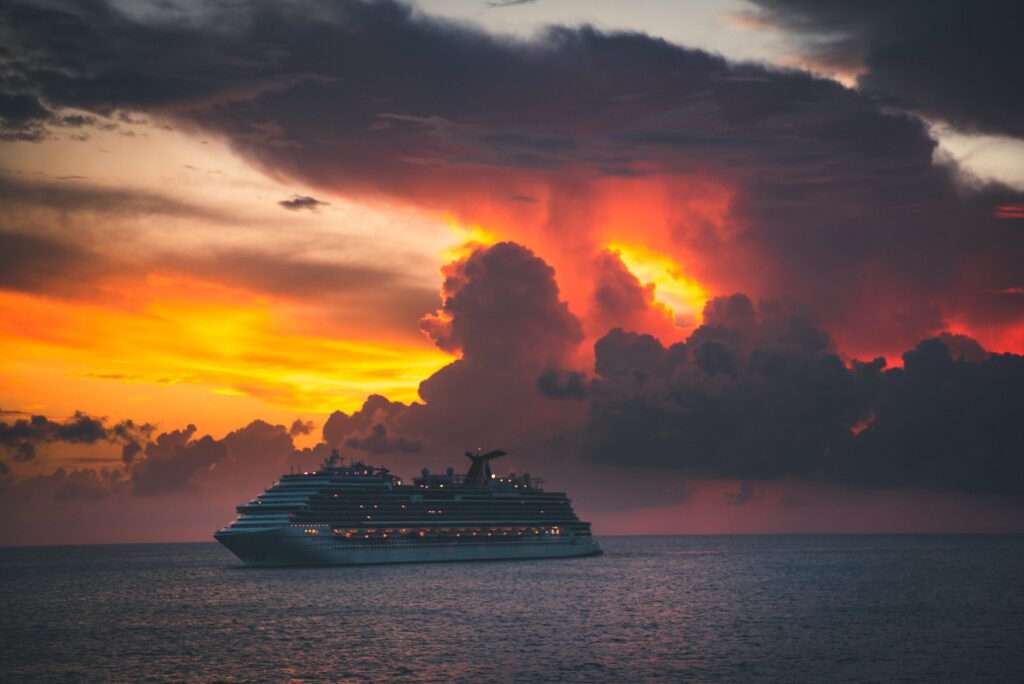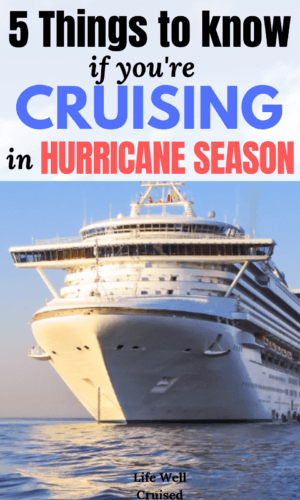Are you considering going on a cruise but worried about the possibility of encountering a hurricane? Look no further than this article to get all the information you need to plan your trip accordingly. Find out when hurricane season typically occurs for cruises and gain a better understanding of how to navigate this potential weather challenge. Whether you’re a seasoned cruiser or a first-timer, this article will equip you with valuable knowledge to ensure a safe and enjoyable journey.

Understanding Hurricane Season for Cruises
When planning a cruise vacation, it’s essential to consider the impact of hurricane season. Understanding what hurricane season is, when it occurs, and how it can affect your cruise plans is crucial for a safe and enjoyable trip. In this comprehensive article, we will explore the key aspects of hurricane season and provide valuable tips to help you navigate through this potential challenge.
1. What is Hurricane Season?
1.1 Definition
Hurricane season refers to the period when tropical cyclones, commonly known as hurricanes, are most likely to form in specific regions around the world. These powerful weather phenomena are characterized by strong winds and intense rainfall, posing risks to maritime activities such as cruises. It is important to note that hurricane season varies depending on the geographical location.
1.2 Duration
The duration of hurricane season can vary, but it typically spans several months. In the Atlantic Ocean, hurricane season officially begins on June 1st and ends on November 30th. However, the peak months with the highest frequency of hurricanes tend to fall between August and October.
2. Key Facts about Hurricane Season
2.1 Frequency of Hurricanes
During hurricane season, the frequency of hurricanes can vary from year to year. Some years may witness an above-average number of storms, while other years may have fewer storms but with higher intensity. It is important to stay informed about the current hurricane predictions and forecasts to assess the potential risks associated with your cruise plans.
2.2 Geographical Distribution
Hurricanes are not evenly distributed worldwide. The Atlantic Ocean and the Gulf of Mexico are particularly prone to these severe storms during hurricane season. Other regions, like the Pacific Ocean and the Caribbean Sea, also experience hurricanes. However, the severity and frequency of storms can differ significantly depending on the specific area and time within the season.
2.3 Peak Months
The peak months of hurricane season typically fall between August and October. During this period, the conditions for hurricane formation are most favorable, increasing the likelihood of encountering a storm while on a cruise. It is crucial to consider these peak months when planning your cruise and take necessary precautions to minimize any potential disruptions.
2.4 Areas Most Affected
Certain regions are more prone to hurricanes than others. The Caribbean islands, the Gulf Coast of the United States, and parts of Mexico are among the areas most affected by hurricanes during the season. These locations have a higher risk of experiencing severe weather conditions, which can impact cruise itineraries and safety protocols. It’s important to be aware of the areas most likely to be affected and consider alternative routes if necessary.
3. Planning Your Cruise During Hurricane Season
When planning a cruise during hurricane season, it’s crucial to have a flexible mindset and consider the potential risks that may arise. Here are some essential factors to consider:
-
Choose the right cruise line: Research and select a cruise line that has a solid reputation for dealing with potential disruptions caused by hurricanes. Some cruise lines have established protocols in place to ensure passenger safety and minimize itinerary changes during severe weather conditions.
-
Consult a travel agent: Seeking the advice of a knowledgeable travel agent can be incredibly beneficial when planning a cruise during hurricane season. They can provide valuable insights and recommendations based on their experience and expertise.
-
Check historical hurricane data: Understanding the historical patterns of hurricanes in your desired cruise destination can help you make informed decisions. Reviewing the past occurrences of storms during the season can give you an idea of the likelihood of encountering a hurricane on your cruise.

4. Flexibility and Travel Insurance
Flexibility is key when cruising during hurricane season. Due to the unpredictable nature of hurricanes, it’s essential to be prepared for itinerary changes or even cancellations. Here’s what you need to know:
4.1 Adjusting Itineraries
In the event of a hurricane or severe weather, cruise lines may modify their itineraries to ensure the safety of passengers and crew. This could involve skipping ports of call or changing the entire route. While itinerary changes can be disappointing, it is crucial to prioritize safety and trust the judgment of the cruise line.
4.2 Cancellations and Rescheduling
In extreme cases, a cruise may be canceled or rescheduled due to an impending hurricane. It is essential to review your cruise line’s cancellation and rescheduling policies before booking. Purchasing travel insurance that covers trip cancellation and interruption is highly advisable to safeguard your investment.
4.3 Insurance Coverage
Obtaining travel insurance that specifically covers hurricanes and weather-related disruptions is paramount. This type of coverage can provide reimbursement for expenses such as delayed departures, missed ports, or even trip cancellation due to a hurricane. Be sure to carefully read the policy terms and conditions to understand the extent of the coverage provided.
5. Monitoring and Weather Updates
To stay informed about the latest hurricane developments and weather conditions, utilize the following resources:
5.1 Official Weather Channels
Regularly monitor official weather channels, such as the National Hurricane Center (NHC) or the local meteorological agencies in your cruise destination. These sources provide up-to-date hurricane forecasts, storm tracks, and other crucial information that can help you make informed decisions about your cruise plans.
5.2 Cruise Line Notifications
Cruise lines maintain close communication with passengers regarding any changes or disruptions caused by hurricanes. Stay connected with your cruise line through email, text message alerts, or their official website to receive timely notifications about itinerary modifications or potential safety precautions.

6. Choosing the Right Cruise Route
Selecting a cruise route that minimizes the risk of encountering hurricanes is an essential aspect of planning a cruise during hurricane season. Consider the following factors to make an informed decision:
6.1 Hurricane-Free Regions
Certain regions are less likely to be affected by hurricanes during the season. For example, cruises to Alaska or northern Europe generally have a lower risk of encountering severe weather systems. Research cruise routes that navigate these hurricane-free regions to increase the chances of a smooth sailing experience.
6.2 Safe Ports and Destinations
When choosing a cruise route, look for ports and destinations that have a lower risk of hurricane impacts. Some locations have protective geographical features or robust infrastructure that can minimize the effects of severe weather. Discussing potential port options with your travel agent or cruise line will help you identify safer destinations.
6.3 Alternate Routes
In the event of an approaching hurricane, cruise lines may opt to change the route entirely to avoid the storm’s path. Flexibility in your travel plans will allow you to adapt to these changes more easily. By considering alternate routes, you can still enjoy your cruise experience while bypassing areas with potential hurricane risks.
7. Onboard Safety Measures
Cruise lines prioritize the safety and well-being of their passengers and crew, especially during hurricane season. Here are some essential safety measures implemented onboard:
7.1 Emergency Preparedness
Cruise ships undergo rigorous safety inspections and are equipped with advanced technology to detect and monitor hurricanes. The crew receives extensive training to handle emergency situations and ensure passenger safety. Familiarize yourself with the emergency evacuation procedures and the location of life jackets and emergency assembly stations on your ship.
7.2 Communication and Guidance
During a hurricane or other severe weather events, cruise lines maintain open communication channels with passengers. Public address systems, onboard apps, and other communication methods are used to provide instructions, updates, and guidance in case of any disruptions or safety concerns.
7.3 Secure Facilities
Modern cruise ships are designed to withstand rough seas and adverse weather conditions. Advanced stabilization systems minimize the movement of the ship, providing a more comfortable experience even during turbulent weather. Public areas and staterooms are equipped with safety features to ensure passenger well-being in the event of severe weather.

8. Tips for Cruising During Hurricane Season
Here are some practical tips to make your cruise experience during hurricane season as smooth as possible:
8.1 Booking Early or Late
Consider booking your cruise early or late in the hurricane season to minimize the risk of encountering severe weather. The beginning and end of hurricane season often see fewer storms, presenting the opportunity for a more enjoyable and uninterrupted cruise experience.
8.2 Packing Essentials
Include essential items in your packing list to ensure preparedness for any weather conditions. Pack lightweight rain gear, sturdy walking shoes, appropriate clothing for both warm and cool weather, necessary medications, and other personal essentials. It’s also advisable to bring a small portable fan or a power bank in case of power outages.
8.3 Being Prepared for Changes
Mentally prepare yourself for potential itinerary changes or disruptions. Understand that your cruise may need to be adjusted to prioritize safety. Maintain a positive attitude, and embrace the unexpected experiences that may arise as a result of these changes.
8.4 Staying Informed
Stay informed and updated about the latest hurricane developments during your cruise. Use the onboard communication systems, check the official weather channels, and follow instructions from the cruise line. By staying informed, you can make informed decisions to ensure your safety and enjoy your cruise experience to the fullest.
10. Final Thoughts
Understanding hurricane season and its implications for cruising is essential for planning a successful trip. By considering the factors outlined in this article, such as choosing the right cruise route, being prepared for changes, and staying informed, you can navigate through hurricane season with confidence. Remember, while hurricanes can pose temporary challenges, cruising during this season can still offer memorable experiences and adventures. Bon voyage!

Hi, I’m Mike, the author of Ocean Bliss Journeys. Thank you for visiting 🙂

